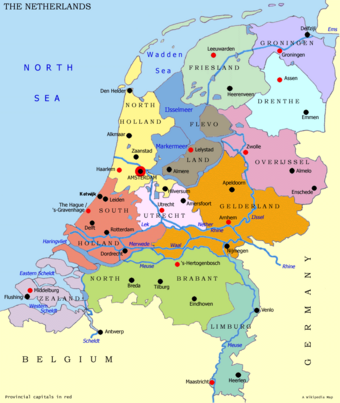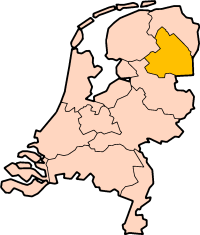Drenthe
| Provincie Drenthe Province of Drenthe |
|||||
|
|||||
| Capital | Assen | ||||
| Largest city | Emmen (proper) | ||||
| Queen's Commissioner | vacant (2008-) | ||||
| Religion (1999) | Protestant 35% Catholic 8% |
||||
| Area • Land • Water |
2,642 km² (7th) 38 km² |
||||
| Population (2006) • Total • Density |
484,481 (10th) 183/km² (12th) |
||||
| Inclusion | 1796 | ||||
| Anthem | Mijn Drenthe | ||||
| ISO | NL-DR | ||||
| Official website | www.drenthe.nl | ||||
Drenthe is a province of the Netherlands, located in the north-east of the country. The capital city is Assen. It is bordered by Overijssel to the south, Friesland to the west, Groningen to the north, and Germany (districts of Emsland and Bentheim) to the east.
Contents |
History
Drenthe, unlike many other parts of the Netherlands, has always been a sparsely populated rural area. Other parts of the Netherlands did not really see this “territory” as a part that belonged to the rest of the Netherlands but more like “wasteland”. This “wasteland”, however, has been populated by people since prehistory, albeit by just a handful. Most tangible evidence of this are the dolmens (hunebedden) built around 3500 BC, 53 of the 54 dolmens in the Netherlands can be found in Drenthe, concentrated in the northeast of the province. Drenthe was first mentioned in a document from the year 820, it was called Pago Treanth (district Drenthe). In archives from "Het Drents Archief" from 1024 to 1025 the "county Drenthe" is mentioned.
After long being subject to the bishops of Utrecht, Drenthe came under the control of Charles V in the 16th century. When the Republic of the Seven United Provinces was declared, Drenthe became part of it, although it did not gain provincial status until January 1, 1796.
Shortly before the outbreak of the Second World War, the Dutch government built a camp near the town of Westerbork to accommodate German (Jewish) refugees. Ironically, during the Second World War, the German occupiers used the camp (which they named KZ Westerbork) as a "Durchgangslager". Many Dutch Jews, Sinti, Roma, resistance combatants and political adversaries were imprisoned before being transferred to other camps in Germany and Poland. Anne Frank was deported on the last train from Westerbork.
The name of this region is said to stem from *thrija-hantja "three lands".
Politics
The provincial council (Provinciale Staten) has 51 seats, and is headed by the Queen's Commissioner, currently Relus ter Beek. While the provincial council is elected by the inhabitants, the Commissioner is appointed by the Queen and the cabinet of the Netherlands. With 19 seats, the social democratic PvdA is the largest party in the council. The daily affairs of the province are taken care of by the Gedeputeerde Staten, which are also headed by the Commissioner; its members (gedeputeerden) can be compared with ministers.

Municipalities
Due to reorganisations in the 1990s, the number of municipalities in Drenthe has been reduced to twelve. Most municipalities therefore now consist of several towns and villages.
- Aa en Hunze
- Assen
- Borger-Odoorn
- Coevorden
- De Wolden
- Emmen
- Hoogeveen
- Meppel
- Midden-Drenthe
- Noordenveld
- Tynaarlo
- Westerveld
Geography
Besides the capital Assen, Emmen, Meppel and Hoogeveen are the major urban centres of the province. Drenthe, consisting mostly of heathland, has no significant rivers or lakes.
Economy
Agriculture is an important employer, although industrial areas are found near the cities. The quietness of the province is also attracting a growing number of tourists.
Drenthe is known as the "Cycling Province" of the Netherlands and is an exceptional place for a cycling holiday, having hundreds of kilometres of cycle paths through forest, heath and along canals and many towns and villages offering refreshment along the way.
Dialect
Drenthe has its own dialect of the Dutch language named after the province, but each town or village has its own version. All dialects are of low-Saxon-language-group.
External links
- Official website
- Map (pdf)
- Map of Province
- The Drentse Fietsvierdaagse, the most famous of all fietsvierdaagses of the Netherlands.
|
|||||||
|
||||||||||||||||||||



